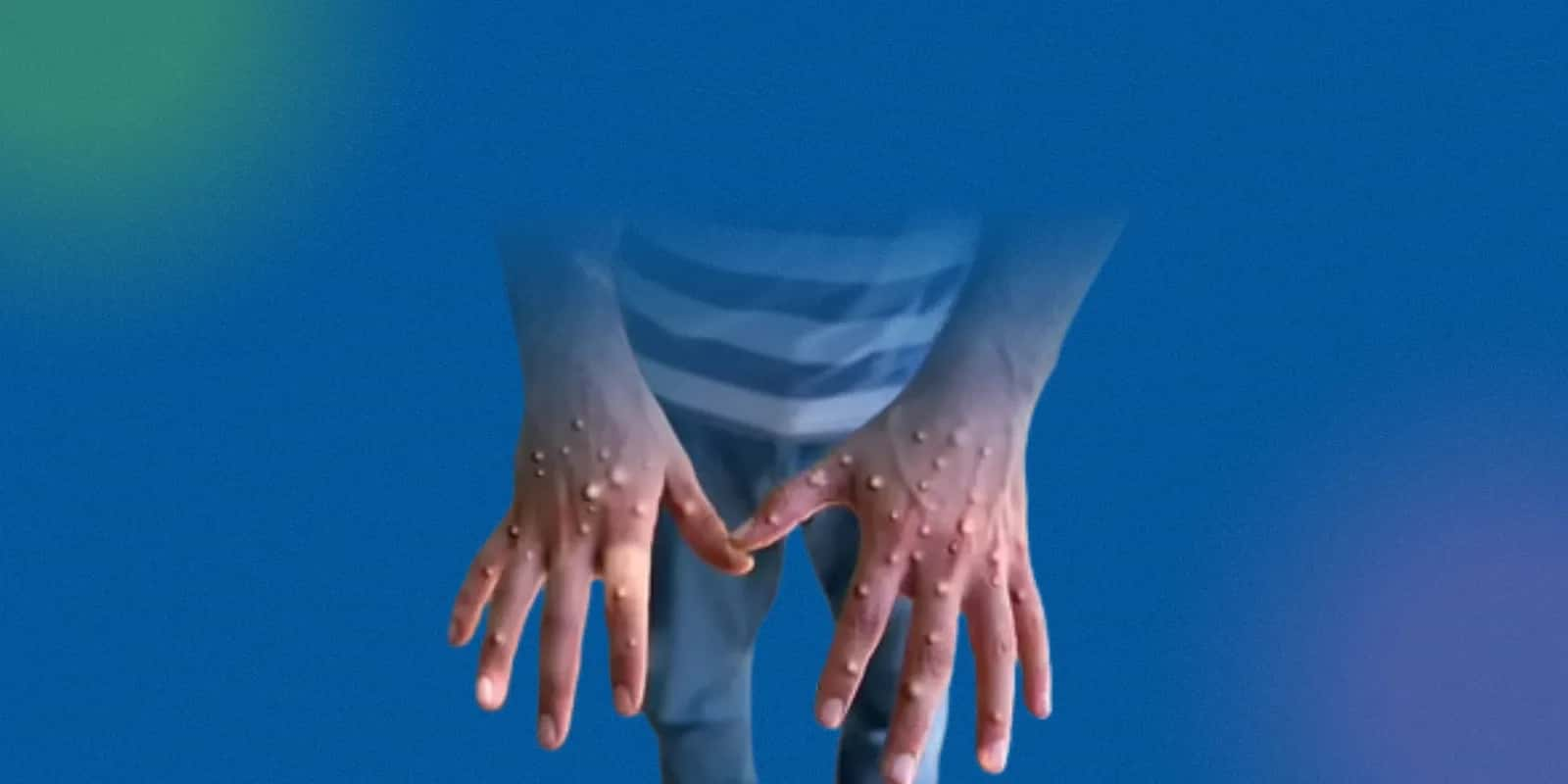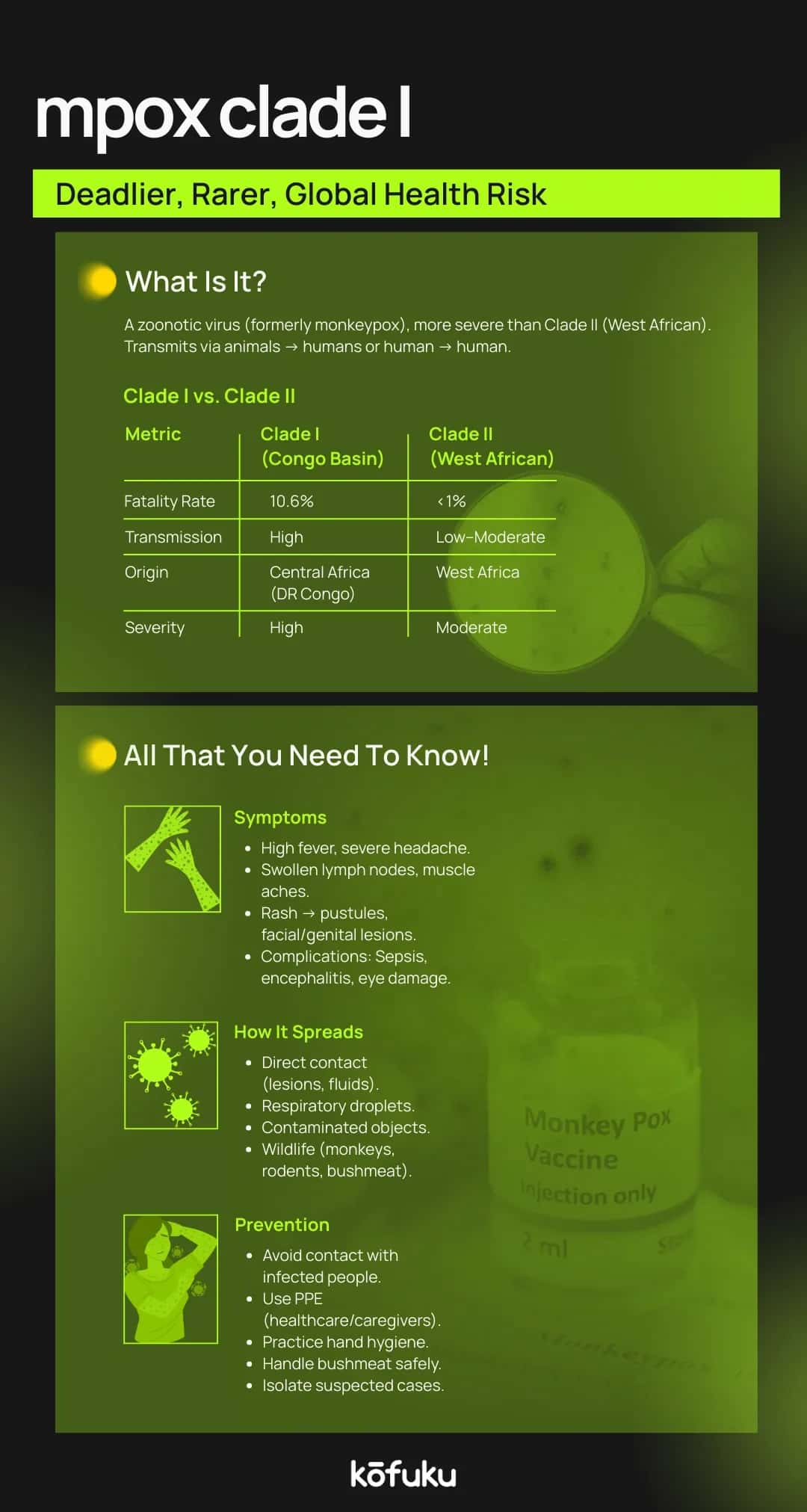First Case of Mpox Clade 1 in India: Everything You Need to Know

Introduction
India has reported its first-ever case of the Clade 1 variant of Mpox in Kerala.
Previous Mpox cases in India had been linked to the milder Clade 2 variant of the disease. Since this is Clade 1, health experts and the public are concerned because of its severity and the danger it poses.
Previous cases show that Clade 1 has led to worse symptoms and more deaths in Central Africa. The Mpox outbreak, along with the discovery of a new strain, Clade 1b, in the Democratic Republic of Congo, led the WHO to issue an international alert.
The new Clade 1b was first found among sex workers in eastern DRC and was first detected in September 2023. Clade 1b cases have also been detected in nearby countries, including Burundi, Kenya, Rwanda, and Uganda, as well as in Asia and Europe.
This article will delve into Mpox, its symptoms, how it has affected people nationwide and essential safety measures that people need to follow to stay safe.
Kerala Case: Health Officials Suggest Staying Vigilant
India reported its first case of the Clade 1b strain of Mpox in Kerala. The case involves a 38-year-old male who had recently travelled to the United Arab Emirates.
This variant has not been reported in India before and is considered more serious than other cases of Mpox that have been recorded in our country. However, health officials confirmed that he is recovering well and there is no need to panic.
The Clade 1 variant is notorious and has been known to cause worse symptoms and fatality rates in countries of Central Africa. But the state health department stated that since this case was detected and treated quickly, the individual is recovering in Kerala.
Apart from that, Kerala Health Minister Veena George assured people that all possible high-risk contacts of the patient have been identified and are under medical surveillance.
The state health department has also initiated its Mpox surveillance system and has been monitoring the situation.

Another Mpox Case identified in Haryana Linked to Clade 2
In a different case, a 26-year-old man from Haryana was also diagnosed with Mpox but with a different strain - Clade 2. This strain, although milder than Clade 1, has still been prominent in the world since 2022.
Health officials stated that the Haryana patient also had a recent history of international travel to a place where there was an ongoing health emergency due to Mpox.
The Union Health Ministry stated that, since this was an isolated case, there is no need to panic, as there is no immediate risk to the public.
How to Recognise Mpox Symptoms Early?
Mpox, also known as monkeypox, is a viral infection associated with the Mpox virus, which belongs to the same family of viruses as smallpox (Orthopoxvirus).
The World Health Organisation renamed Mpox in 2022 in an attempt to minimise the stigma and racism associated with its previous name.
Mpox is transmitted by direct close contact with infected bodily fluids or lesions, by airborne respiratory droplets, or by contact with contaminated materials.
The incubation period for this virus is typically between five and 21 days following exposure.
Common Mpox symptoms:
- Fever and chills
- Headaches and body pain
- Fatigue
- Swollen lymph nodes
- Skin rash with painful sore lesions, most commonly starting on the face and then spreading
Infected people could be at risk for severe complications, such as:
- Secondary bacterial infections
- Pneumonia
- Sepsis
- Encephalitis (brain inflammation) in rare cases

When to Go to the Doctor:
- If you have recently travelled to an area reporting Mpox cases;
- If you develop unexplained rash or flu-like symptoms;
- If you have had close physical contact with a person who is infected.
High-risk groups, such as young children, pregnant women, or people with underlying medical conditions that result in immunocompromised systems, are more vulnerable to contracting Mpox.
Individuals in these groups should seek medical care as soon as they notice any symptoms, especially if they have travelled internationally or have been exposed to someone who has Mpox.
Effective Ways to Prevent Mpox
Health officials are requesting individuals to follow simple and effective precautions to limit their chance of becoming infected or transmitting Mpox. These precautions include:
- Avoid direct physical contact:
Do not come into direct contact with anyone who has visible rashes or lesions, and do not share clothes, towels, or bedding with them. If you accidentally get exposed to someone with Mpox, then don’t forget to go to the doctor immediately.
- Wash your hands regularly:
Use soap and water, or alcohol-based hand sanitiser, to wash your hands thoroughly after contact with a potentially contaminated surface, or just wash your hands whenever you come back home after going out, better safe than sorry!
- Clean and disinfect surfaces:
Clean and disinfect frequently touched surfaces, especially in shared environments such as homes, healthcare facilities, or any public location!
- Isolate if you feel sick:
So, if you believe that you have Mpox, isolate immediately. Report to your doctor right away to avoid the risk of someone else contracting the virus.
- Monitor symptoms after travelling:
If you have travelled abroad recently, especially if travelling to a country with currently active Mpox cases, please continue to monitor your health situation and report symptoms, if any, to your local health authorities.
Consideration for healthcare workers: Healthcare workers treating individuals with Mpox should have access to personal protective equipment (PPE), including gloves, masks, and gowns, and they should wear appropriate PPE in the presence of individuals with Mpox.
Conclusion: Stay Alert, Stay Informed
The discovery of Clade 1 Mpox in India is a serious issue, but the potential for widespread outbreak is significantly lessened by the strength of India's public health systems and emergency response plans.
India's response also highlights the effectiveness of health surveillance and communication between health departments and diagnostic laboratories.
In this case, Kerala's timely progress in identifying and isolating the case is attributed to effective communication within the health department.
At the same time, the discovery of Clade 1 and Clade 2 variants by the Department of Health in a few days also stresses the importance of vigilance, especially when you’re travelling internationally.
Experts say that public awareness and caution are the best prevention measures for Mpox, and this applies not only to our country but to every place battling this disease. So, stay alert and stay safe.

FAQs
Q. What is Mpox, and how is Clade 1 different?
A. Mpox is a viral disease, and Clade 1 is one of its variants. Clade 1 is more severe and has higher fatality risks than other variants, like Clade 2.
Q. How is Mpox transmitted, and what are its symptoms?
A. Mpox is transmitted by close contact, infected objects, or respiratory droplets. The symptoms of Mpox are a chickenpox-like or shingles-type rash. Fever, lethargy, and swollen lymph nodes are also symptoms. If you think you have Mpox, see a physician right away.
Q. Should the public be worried about Mpox outbreaks?
A. Currently, the risk is low, so people don’t need to worry too much about it. That said, public awareness and recognition are still critical. So, be sure to follow precautions and get checked immediately is you suspect exposure to Mpox.
Q. What steps has India taken after detecting this case?
A. India has isolated the person, contact-traced the affected person's contacts, and sent an alert to all healthcare facilities in India for increased vigilance.
Q. Is there a vaccine available for Mpox?
A. Yes. The smallpox vaccinations also provide immunity against Mpox. Individuals at risk need to be vaccinated to prevent contracting this virus.

All You Need to Know About How Contagion Shapes the World

Impact of Contagion on Healthcare Systems and Policies

Is Epilepsy Contagious? Here are 7 Epilepsy Myths You Never Questioned

H5N1 Virus: Global Virus Network Warns of Potential Pandemic

Wetlands Virus: Is It the Next Big Thing After COVID-19?


